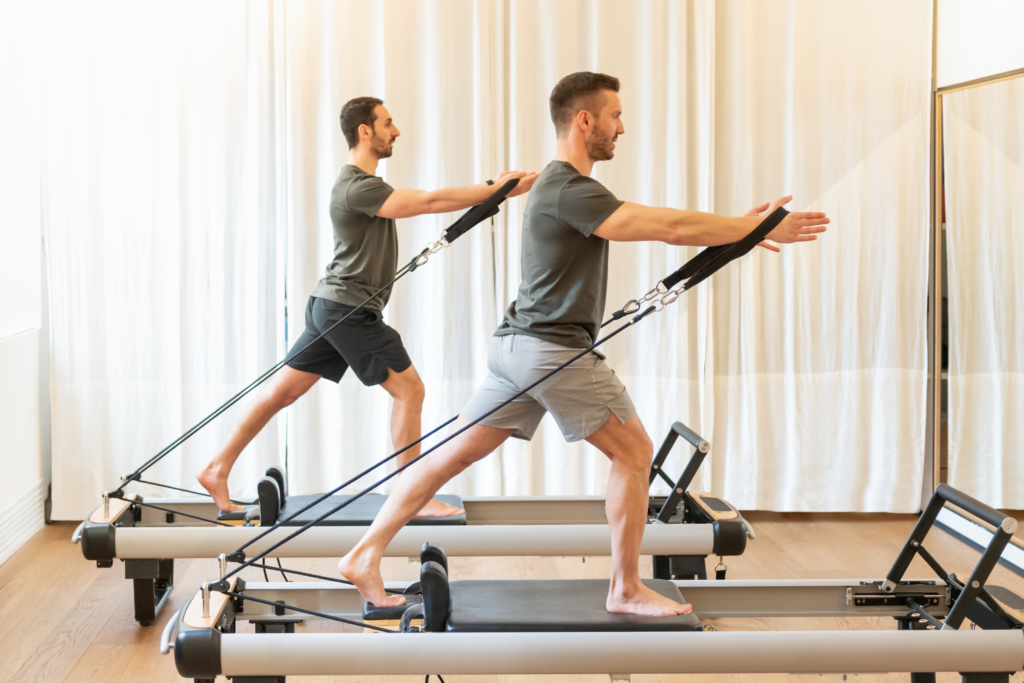

Treatment Services That Heal the Body Along with the Mind
In the pursuit of holistic recovery, addressing both mental and physical health at the same time—along with any co-occurring issues—is paramount for healing. At Wellbridge, we recognize the interconnectedness of the body and mind in the journey toward healing. Our treatment services go beyond addressing addiction issues to encompass the well-being of the entire person.
We offer personalized fitness programs that integrate personal training sessions into rehab. Our certified personal trainers work closely with you to develop tailored exercise regimens that promote physical health and enhance mental and emotional wellness. Our new 10,000-square-foot wellness center is fully equipped with a gym, a yoga studio, a serenity pool, and more to help you rediscover your balance and vitality.
Why is Physical Fitness Important?
Physical fitness is crucial for overall health and well-being.[1] Regular physical activity helps maintain a healthy weight and reduces the risk of chronic diseases such as heart disease, type 2 diabetes, and certain types of cancer.[2] Engaging in regular exercise also strengthens muscles and bones, improves flexibility and balance, and enhances overall physical function, thereby reducing the risk of injury and promoting longevity.
Additionally, physical fitness has profound effects on mental health and emotional well-being. Exercise releases endorphins, neurotransmitters in the brain that act as natural mood lifters, helping to reduce feelings of stress, anxiety, and depression.[3] It can also improve cognitive function, including memory, concentration, and learning, and may even reduce the risk of cognitive decline as we age. Participating in physical activity also provides opportunities for social interaction and connection, which are essential for overall health.
Learn More About Our ProgramsHow Does Substance Use Harm the Body?
Substance use can inflict significant harm on the body, affecting various organs and systems in detrimental ways.[4] Different substances have unique effects, but there are common patterns of damage associated with substance use:[5]
- Brain: Many substances alter brain chemistry, leading to changes in mood, behavior, and cognition. They can disrupt neurotransmitter levels, impair decision-making abilities, and contribute to the development of addiction.
- Heart: Substance use can strain the cardiovascular system, increasing heart rate, blood pressure, and the risk of heart disease, heart attacks, and stroke. Certain drugs, such as cocaine, can directly damage heart muscle and blood vessels.
- Lungs: Smoking substances like tobacco or marijuana can damage the lungs, leading to respiratory issues such as chronic obstructive pulmonary disease (COPD), bronchitis, and lung cancer.
- Liver: Alcohol and certain drugs can cause liver damage, including inflammation (hepatitis), fatty liver disease, cirrhosis, and liver cancer. The liver is responsible for metabolizing toxins, and chronic substance use can overwhelm its detoxification capacity.
- Gastrointestinal system: Substance use can lead to gastrointestinal problems such as gastritis, ulcers, and gastrointestinal bleeding. Alcohol use, in particular, can damage the lining of the stomach and intestines, impair nutrient absorption, and contribute to malnutrition.
- Immune system: Prolonged substance use weakens the immune system, making individuals more susceptible to infections and illnesses. Injection drug use also increases the risk of contracting blood-borne diseases like HIV and hepatitis C.
- Reproductive system: Substance use can disrupt reproductive function in both males and females. It can lead to infertility, sexual dysfunction, menstrual irregularities, pregnancy complications, and birth defects.
- Mental health: Substance use often co-occurs with mental health disorders, exacerbating symptoms and impairing overall well-being. Chronic substance use can contribute to the development of anxiety disorders, depression, psychosis, and other psychiatric conditions.
How Personal Training At Wellbridge Makes A Positive Impact on Addiction Recovery
Personal training can play a vital role in the addiction recovery process by addressing both the physical and mental aspects of wellness:[6]
- Physical health: Substance use can negatively affect physical health, often resulting in poor fitness levels, weakened muscles, and fatigue. Personal training offers a structured approach to physical activity, helping individuals rebuild their strength, endurance, and overall fitness. Through tailored exercise programs, people in recovery can improve cardiovascular health, strengthen muscles, and increase flexibility and mobility, promoting physical well-being and reducing the risk of chronic diseases associated with sedentary lifestyles.
- Mental and emotional well-being: Exercise has been shown to have powerful effects on mental health, helping to alleviate symptoms of depression, anxiety, and stress. Personal training provides a positive outlet for stress relief, helping boost mood, increase self-esteem, and enhance overall emotional well-being. Additionally, exercise stimulates the release of endorphins, neurotransmitters in the brain that act as natural mood lifters, providing you with a sense of accomplishment and empowerment as you progress in your fitness journey.
- Structure and routine: Consistency and routine are essential components of the recovery process. Personal training offers a structured approach to physical activity, giving you a regular schedule and goals to work towards. Establishing a routine around exercise can help develop healthy habits, build discipline, and create a sense of stability in your life—all of which are crucial for long-term sobriety.
- Healthy coping mechanism: Engaging in regular exercise serves as a healthy coping mechanism for managing cravings and triggers associated with addiction. Instead of turning to substances in times of stress or boredom, you can channel your energy into physical activity, providing a healthy and productive way to cope with difficult emotions and cravings.
Frequently Asked Questions About Personal Training for Addiction Recovery
Is personal training suitable for all fitness levels, including beginners?
Personal training is ideal for individuals of all fitness levels, including beginners. Personal trainers are trained to customize exercise programs based on each individual’s fitness level, abilities, and goals. Whether someone is new to exercise or has previous experience, a personal trainer can create a safe and effective workout plan tailored to their specific needs.
What types of exercises are typically included in a personal training program for addiction recovery?
Personal training programs for addiction recovery often include a variety of exercises to improve strength, endurance, flexibility, and balance. This may consist of cardiovascular exercises such as walking, jogging, or cycling, strength training exercises using body weight or resistance bands, flexibility exercises such as stretching or yoga, and balance exercises to improve stability and coordination.
How often should people in recovery participate in personal training sessions?
The frequency of personal training sessions for people in recovery can vary depending on their fitness level, goals, and availability. Typically, individuals may start with 2-3 sessions per week and gradually increase as they progress. Consistency is vital to seeing results, so maintaining a regular schedule of exercise sessions is essential for maximizing the benefits of personal training.
How does personal training help me rebuild physical strength and endurance after addiction?
Personal training plays a crucial role in helping individuals rebuild physical strength and endurance after addiction by providing structured exercise programs designed to gradually increase strength, stamina, and overall fitness. Targeted training exercises can restore muscle mass and improve stability. Cardiovascular exercises also help improve endurance and stamina, while flexibility and mobility exercises help regain range of motion and reduce stiffness.
Can personal training help me transition to a healthier lifestyle after completing addiction treatment?
Yes, personal training can be instrumental in helping individuals transition to a healthier lifestyle after completing addiction treatment. Personal trainers provide guidance on exercise and offer support and motivation to adopt other healthy habits such as proper nutrition, stress management, and self-care practices. Incorporating regular exercise into your routine helps you maintain physical and mental well-being, reduce the risk of relapse, and continue on a path to long-term recovery.
Can personal training help people improve their sleep quality and overall energy levels during recovery?
Personal training can help individuals improve their sleep quality and overall energy levels during recovery. Regular exercise has been shown to promote better sleep by reducing stress, anxiety, and depression, which are common factors contributing to sleep disturbances in individuals recovering from addiction.
Additionally, exercise helps regulate the body’s internal clock and promotes relaxation, making it easier to fall asleep and stay asleep throughout the night. As individuals become more physically active, they often experience increased energy levels during the day, leading to improved mood and productivity.
Sources
[1] Benefits of physical activity. (2024, April 24). Physical Activity Basics. https://www.cdc.gov/physical-activity-basics/benefits/
[2] World Health Organization: WHO. (2019, May 17). Physical activity. https://www.who.int/health-topics/physical-activity#tab=tab_1
[3] Anderson, E., & Shivakumar, G. (2013). Effects of Exercise and Physical Activity on Anxiety. Frontiers in Psychiatry, 4(27). https://doi.org/10.3389/fpsyt.2013.00027 on May 2, 2024
[4] National Institute on Drug Abuse. (2022, March 22). Addiction and health. National Institute on Drug Abuse. https://nida.nih.gov/publications/drugs-brains-behavior-science-addiction/addiction-health on May 2, 2024
[5] SAMHSA. (2022, August 19). Know the Risks of Using Drugs. Www.samhsa.gov; SAMHSA. https://www.samhsa.gov/adult-drug-use on May 2, 2024
[6] Smith, M. A., & Lynch, W. J. (2012). Exercise as a Potential Treatment for Drug Abuse: Evidence from Preclinical Studies. Frontiers in Psychiatry, 2. https://doi.org/10.3389/fpsyt.2011.00082 on May 2, 2024
Transform Your Recovery Journey with Personal Training at Wellbridge
Our certified personal trainers are here to support you as you rebuild your physical strength and improve your overall fitness. Whether you’re just starting out or looking to take your fitness to the next level, our tailored exercise plans are designed to meet your individual needs and goals.
Take the first step towards a healthier, happier you by incorporating personal training (and our state-of-the-art Wellness Center) into your addiction recovery journey at Wellbridge.